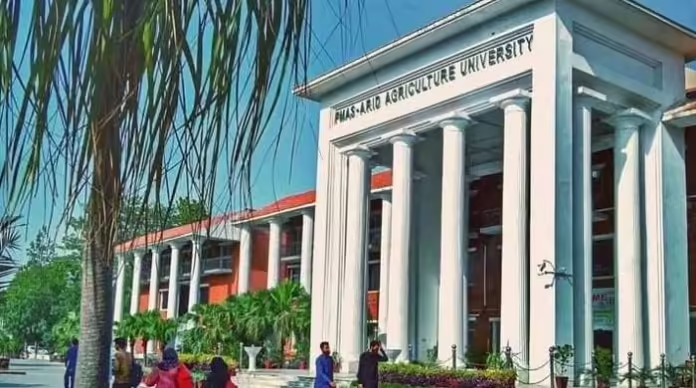PMAS Arid University Rawalpindi is severely criticized for administrative mismanagement
Pir Mehar Ali Shah Arid Agriculture University, Rawalpindi—formerly touted as a center of agricultural excellence and advanced learning—has fallen under the cloud of scandal. Charges of administrative mismanagement, ethnic-based student violence, and misplaced institutional priorities have brought into disrepute what was once regarded as a beacon of scholarly distinction in Pakistan’s education system.
Based on various student representatives, the administration of the university has come crumbling down into anarchy. Ineffective supervision and lack of transparency have supposedly ignited the creation of student ethnic groups, all jostling for power on campus. These factions not only broke academic cohesiveness but also created an environment of fear and hostility among the students.
Ethnic Tensions and Administrative Favoritism
Inmates say that administrative bias and biased decision-making have further entrenched campus polarization. The students blame the university administration for ignoring escalating tensions, which have led to numerous occasions of verbal and physical altercations among opposing groups. What was at one time a site of academic pursuit is now seen by most as a breeding ground for divisiveness.
A student leader who declined to be named bemoaned the plummeting atmosphere:
“The university is losing its academic spirit. Instead of advancing knowledge and research, the administration is advancing show culture.”
Prioritizing Entertainment Over Education
While students are grappling with poor facilities, the administration’s emphasis on entertainment activities like dance and qawali nights has invited widespread scorn. These events, which are being organized in spite of financial constraints, have been viewed as tone-deaf given the institution’s accruing academic and infrastructural issues.
Reports indicate that funds are insufficient for basic needs—from research equipment and scholarships to examination papers and hostel upkeep. The students point out that such misplaced priorities go against the university’s purpose and the spiritual tradition of Pir Mehar Ali Shah, who espoused intellectual development and moral integrity.
Faculty Concerns and Policy Inconsistencies
Staff members, also, have started to raise concerns. They have cited that discipline policies are not uniformly enforced and that the decision-making process tends to take place without effective consultation. Others attest to poor planning and late success for academic programs, adding to the dwindling trust between administration and students.
As seen by observers, such emerging problems are evidence of a crisis of vision and leadership deep-rooted within PMAS Arid University. Rather than promoting academic excellence, the university seems to be struggling with internal malaise and loss of direction.
The Erosion of a Legacy
Pir Mehar Ali Shah Arid University was founded on the mission of encouraging agricultural research, sustainability, and innovation. Now, however, its credibility is at risk as a result of a mix of political interference, administrative neglect, and the absence of upholding academic values. Both students and teachers warn that if rapid reforms are not implemented, the university may lose its position among the top institutions of Punjab.
The increasing discontent highlights an important message: education will not prosper under a regime of favoritism, polarization, and disregard. In order for PMAS Arid University to restore its lost stature, a complete shake-up of the administration and commitment to academic integrity is in order.
A Call for Accountability
The PMAS Arid University crisis is more than an institutional crisis—it’s a microcosm of a larger problem confronting Pakistan’s public universities. Without accountability, transparency, and student-focused governance, these institutions can lose their way from their initial purpose.
The moment discussing reform is now. It is only by taking firm action that PMAS Arid University can regain the trust of its students, live up to its heritage, and become once again a source of light in higher education in Pakistan.
Visit Pakistan Updates for additional coverage of education, governance, and youth affairs.




